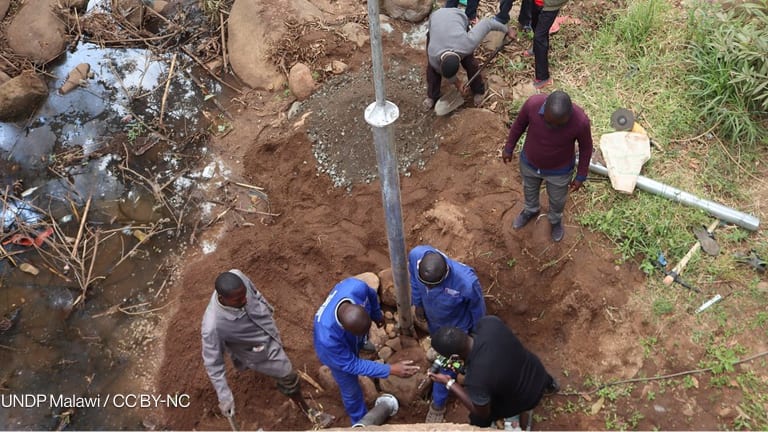No one doubts that Africa’s population will grow meteorically in the next decades.
The continent is expected to go from being home to 15 percent of the world’s population at present to 25 percent of the global population in 2050. Nevertheless, opinions differ with regard to Africa’s projected growth.
In one camp, Africa has its proponents. From that perspective, Africa is “rising,” “emerging,” and “on the move,” and Africa’s population growth could spell opportunity. In the other camp, analysts tracking African demographics lament the lack of a substantive drop in fertility in east, west, and central Africa. These observers apprehensively speak of Africa’s future infrastructure needs, where the prospects of supporting massive populations look grim.
As is often the case, neither side is entirely right or wrong. Africa’s most daunting problem is also an enormous opportunity. Navigating Africa’s population boom is not going to be easy, but it’s also not impossible. Here are three key perspectives policymakers and the private sector need to keep in mind when thinking about Africa’s dramatic population rise over the course of this century.
1. Africa’s growing population is not aging.
Whether that’s a good thing or a bad thing depends on our creation of a framework for employing Africa’s youthful population.
There is no doubt that Africa needs to address its high fertility rates — though it’s worth noting that northern and southern Africa have already made substantial success. Several countries in Central Africa (often in collaboration with NGO and IDAs) have at different times introduced programs to rein in this population growth. However, these initiatives have clearly not resulted in a significant reduction in population growth rates. So how do we move forward? Can Africa have an inclusive economy that caters for this rising and energetic young demography?
See more episodes of IGD’s video series:
● Entering Africa: 3 considerations for your first investment
● Dealing with corruption in Africa: A complex yet surprisingly simple answer
● Dark continent? How Africa's communications revolution is eroding bad press
It’s important to note that many parts of the world will be struggling with the opposite problem as compared with that faced by Africa. The global median age will rise between now and 2050, and in many countries, the number of dependents (people younger than 15 or older than 65) per worker is expected to rise dramatically. In contrast, large African nations like Nigeria, Kenya, and South Africa join India as countries that will see a drop in the per capita number of dependents. That expanding African labor force is good, as long as there are jobs.
2. To expand employment for a larger population, Africa needs an education revolution.
It’s true that access to education in Africa has expanded dramatically, but our next goal is to make sure that that education system is making African youth competitive. Current development of the African education system is very committed to the classic primary-secondary-university model. However, just as developed countries are realizing that not everyone should go to university, Africa needs to make sure that an educational “Plan B” is available.
In other words, Africa needs to expand vocational studies, answering the question of how people can forward themselves outside of the traditional educational track. It’s fascinating to examine the current dearth of vocational training from the perspective of Africa’s current problem with infrastructure maintenance: Simply put, we have the engineers and builders to create the roads and buildings in the first place, but we don’t have the vocational services employees to keep those roads and buildings running.
Vocational training is one piece of a much larger plan that needs to be developed to address Africa’s employment problem. It could be the foundation for creating an inclusive economy.
3. Africa’s population is a market.
This is an insight that has particular significance in the present day.
International investors looking into Africa and extracting its resources are overlooking the huge consumer base sitting in Africa. Telecommunications is an example of what happens when that consumer base is not overlooked: the telecommunications sector has displayed very aggressive market penetration in both urban and rural settings, and in response, Africans have shown themselves willing to consume.
Mobile phones prove that Africans can afford to spend if products are made available and if products are made useful. Investors should think about not only tapping into Africa’s natural resources, but also adding value to those resources domestically. Such a forward-thinking perspective on Africa’s burgeoning consumer class will have resounding investment consequences.
Framing Africa’s population growth with these three considerations, we find that with employment, the right education system, and private sector recognition of Africa’s market potential, concerns about Africa’s population growth can be attenuated.
Unfortunately, all this takes a proactive, long-term commitment on the part of both the public and private sectors.
Africa’s population explosion will be a problem, but with the right long-term vision, it can also be an opportunity. Explore the tremendous opportunities of investing in Africa in Episode 4 of IGD’s video series “Opportunities in Africa — Investing across sectors.”
Watch the third episode of IGD’s “Changing Perceptions” video series here. To learn more about the “Changing Perceptions through Digital Storytelling” project, click here.
Join the Devex community and access more in-depth analysis, breaking news and business advice — and a host of other services — on international development, humanitarian aid and global health.








